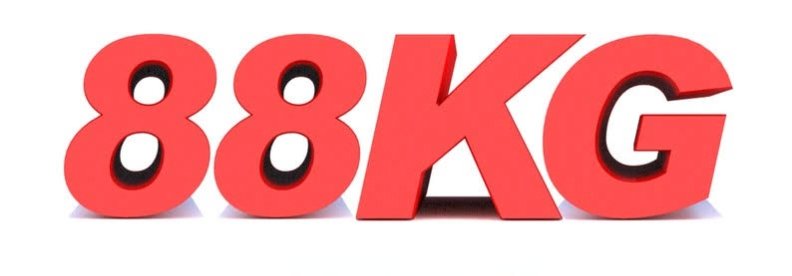Introduction
So, you weigh 88 kg, or you’re curious about what this weight means in different contexts? Whether you’re checking your fitness goals, comparing weight classes, or simply wondering how this weight stacks up, we’ve got you covered.
In this blog, we’ll dive into:
- What 88 kg means in different measurement systems
- How it compares in sports and fitness
- The impact of 88 kg on health and BMI
- Tips for maintaining or changing your weight
- Frequently asked questions about 88 kg
Let’s get started!
1. Understanding 88 kg in Different Units
For those used to other weight systems, 88 kg converts to:
- Pounds (lbs): 88 kg ≈ 194 lbs
- Stone (st): 88 kg ≈ 13.86 st
- Ounces (oz): 88 kg ≈ 3104 oz
If you’re from a country that primarily uses pounds or stones, now you know what 88 kg translates to!
2. How 88 kg Measures Up in Fitness and Sports
Weight Class in Different Sports
88 kg is a significant weight in many sports. Let’s see where it falls in different competitions:
- Bodybuilding & Weightlifting:
In weightlifting competitions, 88 kg is in the middle-heavyweight class, making it a competitive weight category. - Boxing & MMA:
Most major boxing organizations have weight classes that place 88 kg in the Cruiserweight category (up to 91 kg or 200 lbs). - Wrestling:
In professional and Olympic wrestling, 88 kg often falls within the heavyweight or middleweight categories. - American Football & Rugby:
Players in positions like linebackers or running backs often weigh around 88 kg, offering a good balance of strength and agility.
3. Health & BMI Considerations at 88 kg
Body Mass Index (BMI) is a simple way to determine if your weight is within a healthy range based on height.
| Height | BMI at 88 kg | Category |
|---|---|---|
| 5’6″ (167 cm) | 31.8 | Overweight |
| 5’8″ (173 cm) | 29.5 | Overweight |
| 5’10” (178 cm) | 27.7 | Overweight |
| 6’0″ (183 cm) | 25.9 | Overweight |
| 6’2″ (188 cm) | 24.6 | Normal |
What Does This Mean?
- If you’re shorter than 6 feet, you may be in the overweight range.
- If you’re 6 feet or taller, 88 kg can be considered normal weight.
- However, muscle mass plays a crucial role! A muscular person at 88 kg will have a much lower fat percentage compared to someone with less muscle.
4. How to Maintain, Lose, or Gain Weight at 88 kg
If You Want to Lose Weight
- Caloric Deficit:
- Aim to eat 300-500 fewer calories per day.
- Focus on lean proteins, whole grains, and vegetables.
- Exercise:
- Combine cardio (running, cycling, swimming) with strength training.
- Daily steps: Aim for 10,000+ per day.
- Hydration & Sleep:
- Drink at least 2-3 liters of water daily.
- Get 7-9 hours of quality sleep.
If You Want to Gain Weight
- Caloric Surplus:
- Eat 300-500 extra calories per day.
- Include high-protein meals, healthy fats, and complex carbs.
- Strength Training:
- Heavy lifting (compound exercises like squats, bench press, deadlifts).
- Progressive overload (gradually increase weight).
- Consistency & Recovery:
- Aim for 5-6 meals per day.
- Proper rest to allow muscle growth.
5. Common Questions About 88 kg
Q1: Is 88 kg considered overweight?
It depends on your height and body composition. If you have a high percentage of muscle, 88 kg may be a healthy weight. If you have a higher body fat percentage, it may fall into the overweight category.
Q2: How can I lose weight from 88 kg to 80 kg?
To lose 8 kg, aim for a caloric deficit of 500 calories per day, which should result in a weight loss of 0.5-1 kg per week. Combine healthy eating, exercise, and proper hydration.
Q3: How many calories should I eat at 88 kg?
- To maintain weight: Around 2500-2700 calories per day (depending on activity level).
- To lose weight: Around 1800-2200 calories per day.
- To gain weight: Around 3000+ calories per day.
Q4: What is an ideal weight for someone at 88 kg?
There is no single “ideal weight”—it depends on your fitness goals, muscle mass, and body composition.
Q5: How does 88 kg compare for men vs. women?
- For men, 88 kg is a common weight for athletes and muscular individuals.
- For women, 88 kg is considered heavier than average unless the person is tall or muscular.
Conclusion
88 kg is just a number—it can mean peak fitness or room for improvement, depending on your body composition and lifestyle. Whether you aim to lose, maintain, or gain weight, focusing on a balanced diet, exercise, and a healthy mindset is the key.

